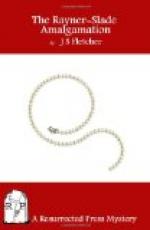“It ’ud be queer if I hadn’t, by this time,” he answered. “Oh yes, I’ve thought things out pretty well, and I should say our people at the Yard have come to the same conclusion that I have—I’m not conceited enough, Mr. Allerdyke, to fancy that I’m the only person who’s arrived at a reasonable theory, not I?”
“Well—what is your theory?” asked Allerdyke.
“This,” replied the detective. “The whole thing, the theft of the Princess Nastirsevitch’s jewels from your cousin, of Miss de Longarde’s or Lennard’s jewels, was the work of a peculiarly clever gang—though it may be of an individual—who made use of both Lydenberg and the French maid as instruments, and subsequently murdered those two in order to silence them forever. I say it may be the work of an individual—it’s quite possible that the man who killed the Frenchwoman is also the man who shot Lydenberg—but it may be the work of one, two, or three separate persons, acting in collusion. I believe that Lydenberg was the actual thief of the Princess’s jewels from your cousin; that the Frenchwoman actually stole her mistress’s jewels. But as to how it was worked—as to who invented and carried out the whole thing—ah!”
“And to that—to the real secret of the whole matter—we haven’t the ghost of a clue!” muttered Allerdyke. “That’s about it, eh?”
Chettle laughed—a sly, suggestive laugh. He gave his companion one of his half-apologetic looks.
“I’m not so sure, Mr. Allerdyke,” he said. “We may have—and that’s why I wanted to see you by yourself. Come round to the police-station.”
In a quiet room in the usual drab and dismal atmosphere which Allerdyke was beginning to associate with police affairs, Chettle produced the personal property of the dead man, all removed, he said, from the Station Hotel, for safe keeping.
“There’s little to go on, Mr. Allerdyke,” he said, pointing to one article after another. “You’ll remember that the man represented himself as being a Norwegian doctor, who had come to Hull on private business. He may have been that—we’re making inquiries about him in Christiania, where he hailed from. According to those who’re in a position to speak, his clothing, linen, boots, and so on are all of the sort you’d get in that country. But he’d no papers on him to show his business, no private letters, no documents connecting him with Hull in any way: he hadn’t even a visiting-card. He’d a return ticket—from Hull to Christiania—and he’d plenty of money, English and foreign. When I got down here, I helped the local police to go through everything—we even searched the linings of his clothing and ripped his one handbag to pieces. But we’ve found no more than I’ve said. However—I’ve found something. Nobody knows that I’ve found it. I haven’t told the people here—I haven’t even reported it to headquarters in London. I wanted you to see it before I spoke of it to a soul. Look here!”




